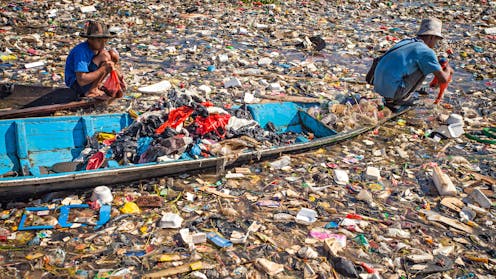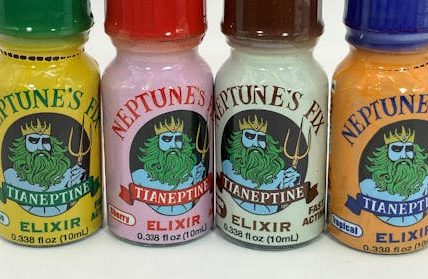A global treaty to limit plastic pollution is within reach – will countries seize the moment?
Bandung, Indonesia. Sony Herdiana/Shutterstock
Representatives from 175 countries will gather in Geneva, Switzerland, in August for the final round of negotiations on a legally binding UN treaty to end plastic pollution. Non-governmental organisations, academics and industry lobbyists will also be in the room. They will all be hoping to influence what could be the world’s first truly global agreement on plastics.
The summit, known as “INC-5.2”, follows a failed attempt to reach agreement in Busan, South Korea, late last year. That meeting ended without resolving important issues, despite hopes that it would conclude the treaty process. Now, it’s crunch time in Geneva.
Either countries bridge their political divides, or risk the whole process falling apart.
I’ve been researching the effects of plastic for more than a decade and have been involved in the UN treaty process since 2022. I’ve attended several of the negotiations and will be in Geneva next month. The science is clear: we need ambitious action which tackles every stage of the plastics lifecycle, from production through to disposal. But the question is, will countries deliver?
Get your news from actual experts, straight to your inbox. Sign up to our daily newsletter to receive all The Conversation UK’s latest coverage of news and research, from politics and business to the arts and sciences.
In 2022, the UN Environment Assembly agreed to develop a legally binding treaty to end plastic pollution. Since then, progress has been slow. Negotiations have repeatedly stalled over issues such as whether the treaty should limit plastic production or regulate chemicals, how to define terms, and how to fund implementation.
Industry lobbying has also played a powerful role throughout. At the last round of talks, lobbyists for the petrochemical and plastics industries made up the single largest delegation. They outnumbered representatives from the EU, all of Latin America, the Pacific islands, independent scientists and Indigenous communities. This imbalance threatens to weaken the science-based action that is urgently needed.
Although countries failed to reach agreement in Busan, a foundation was laid. They agreed to continue negotiations using the “chair’s text”, which is a draft treaty with multiple options still on the table. That document forms the starting point in Geneva. But it remains uncertain whether enough common ground can be found to finalise the text.
What’s at stake?
This treaty is a once-in-a-generation chance to tackle one of the world’s most urgent environmental crises. More than 450 million tonnes of plastic are produced every year. That figure is expected to double by 2045 if current trends continue.
Only around 9% of plastic is ever recycled. The rest is landfilled, incinerated or ends up polluting the environment.
An estimated 139 million tonnes of plastics pollute marine and fresh water. But that could be significantly higher when considering leakages of plastics to land, and from microplastics, which are plastics smaller than 5mm in diameter.
Plastic is found in the deepest oceans, the remotest mountains and inside the human body. While scientists are only beginning to understand the long-term implications for human health, biodiversity and climate, studies show harmful effects of plastics and their chemicals on animals and ecosystems.
Plastic pollution doesn’t respect national borders. It moves through rivers, oceans and air, and gets carried across continents. Global supply chains and waste exports have made this a problem no country can solve alone. That’s why a global treaty is essential.
Crossroads
Despite this growing urgency, a disparity in positions has hindered progress and continues to divide delegations.
Some, such as members of the High Ambition Coalition, a group of countries committed to progressive climate action, want strong rules to cap plastic production, phase out toxic chemicals and hold polluters accountable. Others, often with prominent petrochemical industries, argue for a weaker, voluntary approach focused mainly on recycling and waste management.
Read more:
A global plastic treaty will only work if it caps production, modelling shows
If these divisions aren’t resolved, there’s a real risk the treaty will end up being too watered down to make a difference. A patchy, fragmented agreement would fail to curb rising plastic production and could undermine the integrity of global action.
Between December’s meeting in Busan and next month’s talks, countries have been holding smaller meetings to try to find compromise. That momentum must now be carried into the final negotiations.
Important articles in the draft treaty, including those on chemicals and products, plastic production and finance, remain contested. Whether those provisions are strengthened or diluted will shape the treaty’s effects for decades to come.
Flexibility will be needed. But leadership is also crucial. Countries that support an ambitious outcome must stand firm and bring others with them.
As we approach what may be the final negotiating round, we’re at a critical crossroads. The world has the chance to take meaningful action on plastic pollution. Let’s not waste it.
Don’t have time to read about climate change as much as you’d like?
Get a weekly roundup in your inbox instead. Every Wednesday, The Conversation’s environment editor writes Imagine, a short email that goes a little deeper into just one climate issue. Join the 45,000+ readers who’ve subscribed so far.
Winnie Courtene-Jones is an unpaid member and working-group lead of the Scientists’ Coalition for an Effective Treaty; an International network of independent scientific and technical experts contributing robust scientific evidence to the Treaty process.


